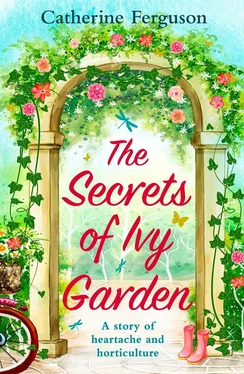Actually, the way I usually remember her now is in the old gardening garb she used to wear, or in her hiking gear, fresh from walking in the country lanes around Appleton.
A painful lump wedges in my throat.
This is how it happens. I’ll just be starting to think I’m doing okay, coping well, beginning to make plans – then boom! The thought that I’ll never be able to see Ivy or hug her ever again sends a flood of grief washing through me.
Hot tears prick my eyelids. The nails-in-palms trick isn’t working. Then something Ivy used to say zips into my mind: Worry’s like a rocking chair: it gives you something to do but never gets you anywhere.
I swallow hard, picturing her giving me one of her no-nonsense pep talks. It’s almost as if she’s sitting right here next to me, a twinkle in her eyes, on the bench in her beloved Ivy Garden. Telling me not to worry because things are never as bad as they seem and I’ll figure it out somehow.
Of course! That’s where I need to be.
Ivy Garden.
Her favourite place in the whole world.
With my eyes still closed, I picture Ivy Garden the last time I saw it, on that final weekend I spent with her.
It was a hot August day. We wandered over the road and squeezed through the gap in the hedge, to the dappled woodland clearing that, over the years, Ivy had transformed into a sanctuary of peace and tranquillity.
She discovered the place years ago, when she was newly married to Peter, my granddad. He died long before I was born, when my mum was only three years old. Ivy never talked about Peter much, except to say he was ‘a good man’. She said that a lot whenever I asked her what he was like, so I still only had a rather hazy impression of him. He was a self-employed accountant and I got the impression he worked really hard. I think Ivy liked to escape the house and leave him in peace with his calculations. More than once, I heard her say laughingly that her ‘secret garden’ had kept her sane during her marriage.
The clearing in the trees was on public land, on the edge of a wood, and Ivy nurtured it into a lovely woodland garden. She planted shrubs, flowers and grasses for every season, so there was a rolling show of colour all year round, from the banks of snowdrops and crocuses as the frosts of winter melted into spring, to the glorious russets of autumn. Many of the villagers knew about the garden and would pop in for a chat while she worked. She often lounged on the old wooden bench reading the blood-curdling thrillers she loved, her feet up, with an old cushion at her back. She never seemed to mind being interrupted.
Someone once referred to it as ‘Ivy Garden’ and the name stuck.
We were there that blisteringly hot afternoon to pick lavender so that Ivy could make her perfumed drawer sachets to sell at the Appleton summer fete. She would run up the tiny white muslin bags on her old sewing machine and then fill them with the evocatively scented dried herb, tying them up with silky pink ribbon. The proceeds would be donated to the village hall community fund.
After we picked the lavender that day, she set her old gardening trug on the mossy ground and we sank on to the wooden bench under the dappled shade of an oak tree, and drank chilled pear cider straight from the bottle. It was a relief to be out of the sweltering sun and we lingered there a long time, soaking up the birdsong and the buzz of nature, as Ivy Garden weaved its magic around us.
To our right, the glorious banks of aromatic lavender nestled close to a stone bird bath Ivy had discovered long ago in a local antique shop. Opposite the bench where we sat, on the far side of the little clearing, the tall privet hedge that bordered the road had been ‘scooped out’ to provide a shady place for a little wooden love seat that was Ivy’s pride and joy. She’d had that love seat for years and it was looking a little battered now. But it fitted perfectly in the space, as if it had been designed specially. Back then, at the height of summer, drifts of scented lilies and white foxgloves took pride of place in the garden.
The taxi slows and I hear the swish of rainwater as we drive through a flooded part of the road. I open my eyes. It’s getting dark, rain still lashing down outside and we’re motoring through another village, past a row of pretty cottages built from golden sandstone.
Moonbeam Cottage itself sits in a little row of properties just like these, directly opposite the gap in the hedge that leads to Ivy Garden. And in a lovely example of serendipity, the cottage came up for sale at exactly the time Ivy was thinking about selling the big house in Appleton, after my granddad died, and downsizing to a smaller place. She must have been so excited when Moonbeam Cottage, right over the road from her woodland garden, came up for sale. It probably seemed as if destiny had taken a hand.
During my last visit, she was keen to show off her new garden shed, a very pretty creation in shades of white and peppermint green. Fixed to the side of the door was a wooden placard with a verse carved into it:
If you long for a mind at rest
And a heart that cannot harden
Go find a gate that opens wide
Into a secret garden.
Ivy laughed and said the poem was a bit cheesy for her taste, but she wholeheartedly agreed with the sentiment, so it was staying put.
I stare out of the taxi as the fields and houses flash by. When I get to the cottage, I’ll dump my bags and go straight over the road and through that gap in the hedge. If my grandma’s spirit is to be found anywhere, it will be there. In Ivy Garden.
It’s almost May, which is when the bluebells bloom.
A little stab of reality hits. I’m planning to clear the cottage and get it on the market in double-quick time so I can get back to Manchester as soon as I can. So I probably won’t be here when the bluebells come out.
A chill cloud passes over. But I shake it off and check my phone for messages. I can’t afford to be sentimental about Ivy Garden or Moonbeam Cottage or bluebells. They represent Ivy’s past, not mine.
The signs for Appleton are becoming more frequent now; I draw in a deep, slightly shaky breath. We’re almost there.
And that’s when my heart plummets.
Oh, bugger! I came prepared for a bus journey, not a taxi. I don’t have enough cash on me to pay the fare!
When I break the bad news to the driver, he says he thinks there’s a cash point outside the village store, and to my relief, when we draw up outside it, so there is. The driver escorts me to the hole in the wall, clearly worried I’m going to run off into the gloom without paying. And then, joy of joys, the bloody machine isn’t working.
I turn in a panic, as the wind swirls an empty crisp packet around my feet. ‘I’m so sorry.’
Oh God, what do I do now?
His arms are folded and he’s wearing a resigned expression, as if he doesn’t believe a word I’m saying.
Then a voice says, ‘Can I help?’
I swing around and a man steps out of the alleyway that runs alongside the village store. He arches his brows expectantly.
Читать дальше












